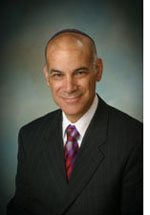|
By Rabbi Leonard Rosenthal
 SAN DIEGO—Early Wednesday morning I prepared for my monthly class at La Vida Real only to set aside the material once I arrived. A Christian woman who attends the class asked me to explain why some Jews she knows say they do not believe in God. She did not understand how someone could claim to be a Jew and even attend synagogue services, and at the same time declare themselves an atheist. Why would someone belong to or attend a synagogue if they don't believe in God and how do they explain all of the miracles and commandments found in the Hebrew Bible? SAN DIEGO—Early Wednesday morning I prepared for my monthly class at La Vida Real only to set aside the material once I arrived. A Christian woman who attends the class asked me to explain why some Jews she knows say they do not believe in God. She did not understand how someone could claim to be a Jew and even attend synagogue services, and at the same time declare themselves an atheist. Why would someone belong to or attend a synagogue if they don't believe in God and how do they explain all of the miracles and commandments found in the Hebrew Bible?
The members of my class discussed her questions for the next hour. The answers were complex, but in a nutshell, we told her that while Judaism is the religion of the Jewish people, not all Jews practice Judaism. Many Jews identify as Jews and attend synagogues for reasons other than prayer and worship. Jews also belong to synagogues because of a shared history, culture, heritage, corporate memory, or feelings of responsibility toward other Jews.
Historically synagogues have had three functions. They are: beit knesset, house of assembly, beit midrash, house of study, and beit tefillah, house of prayer. Some Jews participate in synagogues not so much for the latter, but for the former reasons.
I also pointed out that many Jews who claim to be atheists are in fact not atheists. They may reject the image of God as the old bearded man in heaven who passes judgement on those of us below but they do admit to believing in some "Higher Power." "Higher Power" is simply another name for God.
Go to top of right column
|
|
Finally, this student was looking at the Bible literally. Most Jews do not take the Bible literally, that is, as the direct and exact communication of God. We believe it is Divinely Inspired but it is nevertheless the product of human beings and, therefore, subject to interpretation and error.
Even those on the extreme right don't always take the Torah literally such as Genesis' claim that Adam and Even heard the sound of the "Lord God moving about in the garden in the breezy time of the day." (Gen. 3:8) The Bible speaks in metaphor and poetry, not with scientific accuracy.
A traditional commentator noted that the Torah has at least one human mediator: Moses! In Lev. 27:34 the Torah says: "These are the commandments that the Lord gave Moses for the Israelite people on Mount Sinai," but in parashat Masei, the Torah says: "These are the commandments and regulations that the Lord enjoined upon the Israelites, through Moses...." (Num. 36:13)
Why the difference in wording? To teach us that on Mt Sinai while God gave Moses the commandments, the entire nation of Israel was present and experienced God's revelation first hand. However, after the moment of revelation passed, subsequent generations could only come to know the commandments through the teachings of Moses and not through direct knowledge of God.
As I indicated above, the discussion at La Vida Real was broad and far reaching. There was a lot to digest but, minimally, I hope the participants in my class walked away knowing that there are many ways to identify as a Jew and that our obligation as Jews is to continue seeking God's Will in our sacred texts and from the world around us.
|
|

